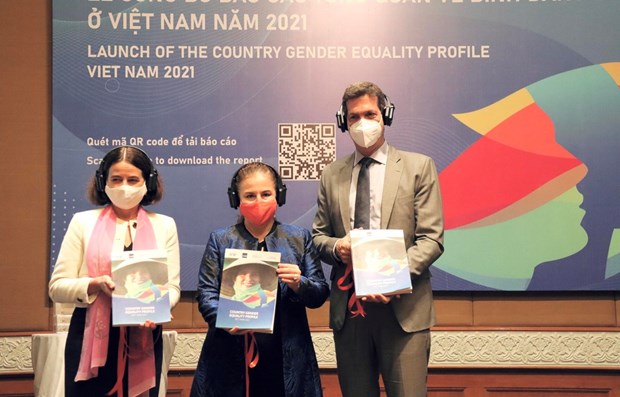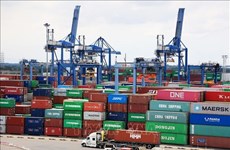First overall report on gender equality in Vietnam released
 COVID-19 has greatly affected female labourers in Vietnam, worsening gender gap on the labour market. (Photo: VNA)
COVID-19 has greatly affected female labourers in Vietnam, worsening gender gap on the labour market. (Photo: VNA)Hanoi (VNA) – Country Gender Equality Profile Vietnam 2021 (CGEP), the first comprehensive report on the gender equality situation in Vietnam, was released at a conference on October 26 by the UN Women, the Australian Embassy in Vietnam, the Asian Development Bank (ADB) and the International Labour Organisation (ILO).
Addressing the event, Elisa Fernandez Saenz, Country Representative of UN Women in Vietnam, said that this was the first time an overall report on gender equality was announced in Vietnam. The report showed that gender equality is not a marginal issue, but the core to the quality, permanence and progress of Vietnam's socio-economic development.
Since 2000, Vietnam has carried out national gender assessments every five years. The inter-sectoral effort aims to provide an overall view on progress that Vietnam has gained in major indications on gender equality, while giving analysis and recommendations to deal with obstacles in the field and narrow down the gender gap.
The report is a helpful information sources assisting the mainstreaming of gender equality during the preparations for the Sustainable Development Cooperation Framework Engagement (UNSDCF) in the 2022-2027 period.
The CGEP is expected to play the role as a guidance in supervising the implementation progress of the Sustainable Development Goals in Vietnam through a gender responsive lens.
Implemented in one year, the report includes knowledge, advice and consultancy from many agencies and individuals, including the Department of Gender Equality under the Ministry of Labour, Invalids and Social Affairs, the General Statistics Office as well as domestic and foreign experts.
It gives a number of recommendations to Vietnamese State agencies on how to make wide-range changes on the gender equality situation, focusing on three major action areas such as strengthening the implementation of existing commitments on gender equality; removing fundamental barriers to gender equality; and promoting the progress in gender equality in the next decade.
Speaking at the launching ceremony, Australia’s Ambassador to Vietnam Robyn Mudie said they had invested in this data collection because of a belief in the power of evidence – to stimulate debate, and drive policy, services and opportunities.
Andrew Jeffries, Asian Development Bank (ADB) Country Director for Vietnam, said that accelerating progress in gender equality was one of the ADB’s operational priorities under ADB’s region-wide Strategy 2030, and they were very pleased to see that the report in particular covered gender analysis in its operational areas in Vietnam, such as the environment, and urban and rural development.
This report was finalised as Vietnam was responding to its fourth wave of COVID-19 and, unfortunately, sex-disaggregation of the official case numbers are not available. However, unlike previous global public health and financial crises, COVID-19 has been singularly detrimental for women and girls, and has exposed gendered fault lines in the economy and social structures.
According to the report, among key recommendations to narrow the gender gap in Vietnam are the needs to develop and implement a national communication strategy to tackle gender-biased social norms using evidence and data on the negative impacts of those norms for the country’s socio-economic development.
It is also necessary to recognise and remove the barriers faced by women in the workplace and business, by promoting equality in access to safe, decent, formal work and equalising access to information, resources and supports such as the access to markets and financing on non-discriminatory and non-punitive terms for women in business.
It is time to recognise, reduce and redistribute women’s unpaid work through public campaigns on a shared division of labour in the household and by facilitating greater investment in gender-responsive social and economic infrastructure such as child/elderly care services./.













